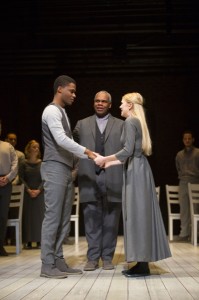 The history is fairly palpable in the new production of Thornton Wilder’s “Our Town” at Ford’s Theater.
The history is fairly palpable in the new production of Thornton Wilder’s “Our Town” at Ford’s Theater.
It’s the 75th anniversary production of the Pulitzer Prize-winning play that reflected life in a tiny New England town over a period that concludes exactly 100 years ago. And then there’s the setting. As a recent resident to D.C., I find it astounding that plays still run in the place where Lincoln was shot (are books still shipped from the Texas Book Depository?).
It’s a lovingly restored historic site, to be sure, though it uses as a modern theater are of question (view-blocking columns still hoist the balcony, for example). And one spends a lot of the time before the curtain staring up at that presidential box, still lined in patriotic bunting, measuring the distance the assassin had to jump from box to stage and so forth. I thought it would be completely distracting to have in the line of view while a production was on.
It is the strength of Wilder’s play, and the arresting presentation, that it makes one forget for a time the weight of that historic corner of the room.
Under Stephen Rayne’s direction, actors began strolling in and taking their places on opening night Wednesday even as theater director Paul R. Tetreault was still thanking corporate sponsors.
The stage by Tony Cisek was already striking: a severely raked wooden stage with a couple dozen white wooden chairs onto which the townspeople dressed in variations of gray by costume designer Kate Turner-Walker took their places.
And then the stage manager, played by an actress with a single name, Portia, stood in black and cued the lights.
There may be some notion that the Ford’s “Our Town” is updated or somehow made timeless. Promotional pictures of the cast wearing identical white (never seen on stage) make them look like they may be part of a futuristic cast.
But while Portia’s Stage Manager remains timeless — she knows the fates of the people she introduces — the fictional Grover’s Corners, N.H., at the base of Monadnock Mountain, is forever stuck in its original setting, from 1901 to 1913, with the milkman coming by with his horse-drawn cart, or people murmuring about newfangled horseless carriages.
Even the once universal truths espoused by the Stage Managers are sadly no longer true. Considering contemporary rates, the notion that “almost everybody in the world gets married” is just not the case in the 21st century.
And yet much of Wilder’s play still connects, particularly in its notions of universality found in a specific place and its insistence to live, take notice of, and celebrate each waking moment.
More than marveling at aspects of the play’s power 75 years later, one thinks of what a shock “Our Town” must have seemed in 1938 with its stark stage, reliance on mime to indicate even the smallest props, and its casual, direct language.
The one unstated update of “Our Town” at Ford’s comes in its open casting, with actors of every color and nationality replicating what was at that time undoubtedly a wholly white community. It’s not a small point, especially as the Town Manager brings out an historian to recount the number of Poles or Slavs on the other side of the tracks or those with traces of the Native American tribe that once lived there but were wiped out.
After a long initial act in which the main characters of two families whose teenagers have gotten romantically involved are introduced, the next two acts are fairly swift: the wedding, in which the chairs are re-arranged accordingly, and in the third, and most visually striking, a scene in the cemetery, where the dead comment on the living.
There, Cisek’s design carries the show’s greatest punch, as 20 of the now-familiar white chairs are now suspended in the air, some a few inches above the floor, others two or three stories up, suspended by wires. Six of them have passed townspeople in them, swaying imperceptibly on their precarious swings – artfully arranged in the dark, bleak sky like umbrella men in a Magritte painting.
The image is so dynamic it competes a bit with Wilder’s strongest commentary – the horror of not really being seen or heard or looked at while engaging with one’s closest loved ones.
Alyssa Gagarin makes the strongest impression as the young woman who screams out this hard-learned lesson. But so much of the rest of the cast leave as little impression as their grey togs, giving that opposite notion that these are people who are indeed ghosts in their everyday lives, going through the motions as if shadows.
Still, there’s something noble and a bit historic about the effort of both the original play and its present revival (the next offering at Ford’s will be “Hello Dolly,” the musical made from another of Wilder’s plays, “The Matchmaker”).
And just as jarring as the Stage Manager’s first act shout out to the audience breaking the fourth wall (“Is there anyone in the audience who would like to ask Editor Webb anything about the town?”), is her unusual turn toward the Lincoln presidential box in the solemn third act, acknowledging the site’s legacy as she mentions the Grovers Corners boys who died in the Civil War.
The graveyard had been around her the whole time.
“Our Town” runs at Ford’s Theater, 511 10th St NW, Washington, DC, through Feb. 24.